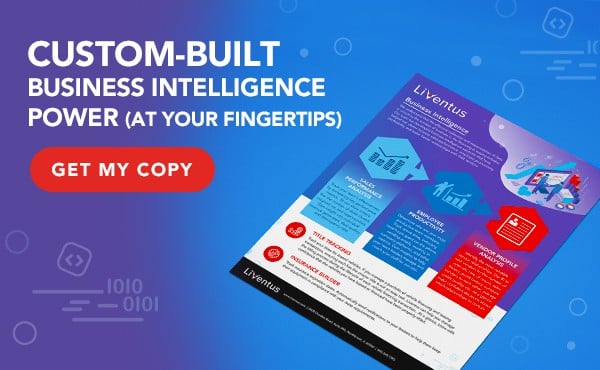Nobody likes uncertainty. I think our responsibility as finance and leasing experts is easing customer fears by removing uncertain outcomes. Where do we even start? Data.
Sharp Tools, Sharper Judgements
Insights build confidence and data provides insight. As technology experts with a focus on finance and leasing, we have to create business intelligence (BI) models that provide the confidence our customers need to make smart business decisions. If we discover sharp ways to fix complex problems, we will find answers that drive growth, which is especially great during uncertain times.
What are some ways Business Intelligence can help you? Here’s a quick guide for providing helpful solutions to your finance and leasing problems.

So, how do we as technology experts in the finance and leasing world analyze business objectives at a glance, solve complex problems, and make stable decisions? Here are three ways:
Forget About Collecting Irrelevant Data (Quality vs. Quantity)
Whenever data is discussed, machine learning comes up.
Machine learning is a small yet powerful part of data science. It’s the process of using a computerized algorithm that “learns” from a series of historical data with the goal of making accurate predictions and outcomes. When used correctly, it influences business-making decisions by “teaching itself” to establish benchmarks, monitor KPIs, and optimize estimated costs.
Here’s an example. A sales manager is reviewing her team’s profitability from the previous year. While she’s inspecting the numbers, an algorithm in the background is also looking at the data, looking for trends and insights that will help the manager predict next year’s budget. But for the prediction to be accurate, the data needs to be relevant.
In today’s world, it’s easy to collect irrelevant data.
The introduction of the internet and credit card provided opportunities for companies to collect large volumes of customer data and tap into predictive analytics. One assumed strategy was the more data you collected, the more accurate your data-learning outcomes and results from your analysis. But that’s not the case.
Real competitive edge comes from leveraging high-quality data, not large volumes of it. For finance and leasing teams, there’s more value in getting the right kind of data rather than more.
With the right kind of data, your leasing company can keep track of and learn about deal qualities, individual revenue generated, and vendor information that help make confident decisions about which relationships to nurture.
It doesn’t matter how much data you feed your machine-learning algorithm: Spoiled ingredients make spoiled meals every time.
Prioritize People, Not Just Information
Don’t get me wrong… quantitative data has its place for discovering insights and learning how your company runs. Don’t make the mistake of misplacing where the real value is. Algorithms are valuable, but they can only do so much.
People create innovations, not algorithms. While measuring data is comforting to decision makers and stakeholders, it doesn’t take into account the person who makes qualitative judgements with the information.
For example, many companies have shifted to remote work offices, which leaves managers grappling with finding new ways to understand employee productivity. Implementing a business intelligence suite of tools could enable those managers to gain insights on some tasks your team is doing, such as how much time they spend on each activity. This doesn’t mean monitoring KPI’s is the only way to assess productivity. Using business intelligence tools without leadership, coaching, or selecting the right metrics for your organization can create divisions on the team and give misleading data.
Remember: The world is run by people, not AI (at least for now).
Understand How to Use Your Tools
Part of our responsibility includes knowing the consequences of the tools you’re using and how they’re implemented. Don’t get me wrong: It’s fun discovering a new tool and learning how to use it, but you have to be careful. You don’t run with scissors (hopefully), so why would you do the same with your business intelligence?
When we use technology, we have to understand that (like anything) there is an evolution to it that needs to be constantly addressed and tweaked in order to keep it on the right track. With 59% of enterprises expected to exceed their public cloud usage plans this year due to COVID-19, how does a company find a balance between using business intelligence tools efficiently and ethically? Some questions to consider are:
- Will what I’m doing with BI help my business?
- Is what I’m doing with BI consistent with my corporate values?
- Does what I’m doing with BI fall within my own personal comfort?
- Am I okay with being part of the data?
If we are using technology ethically and understand that like anything, there’s an evolution to it that needs to be constantly addressed and tweaked in order to keep it on the right track. That ensures it doesn’t take a wrong turn. When someone gets lost in the technology and only focuses on whether they can do something, the risks could be too much to handle.
If we want to successfully mitigate risk for our customers, we have to understand the potential dangers of our machine-learning models, data collection, and the people using them. In this digital-paced world, it means taking the time to consider what your next steps really mean. If we expect to become experts of our business intelligence tools, we need to invest the time in not only learning how to handle them effectively but responsibly too.
Sharpen Your Business Intelligence with Liventus
We know what it’s like to live in uncertainty. At Liventus, we emphasize the importance of creating value with efficient automation, creative people, and responsible tool use.
Similar to how Sam and I have grown Liventus organically over the past 18 years, we simply identify ways to constantly make things better. Our goal with Business Intelligence is to help your company grow exponentially, just like we’ve done over nearly two decades and become one of Inc’s Top 5000 companies.
At Liventus, we build finance and leasing portfolio automation and management tools that improve decision making — making your business more effective and efficient. Reach out to us today and let’s start building together!
Dan Levin is president and co-founder of Liventus. Connect with him on LinkedIn here


